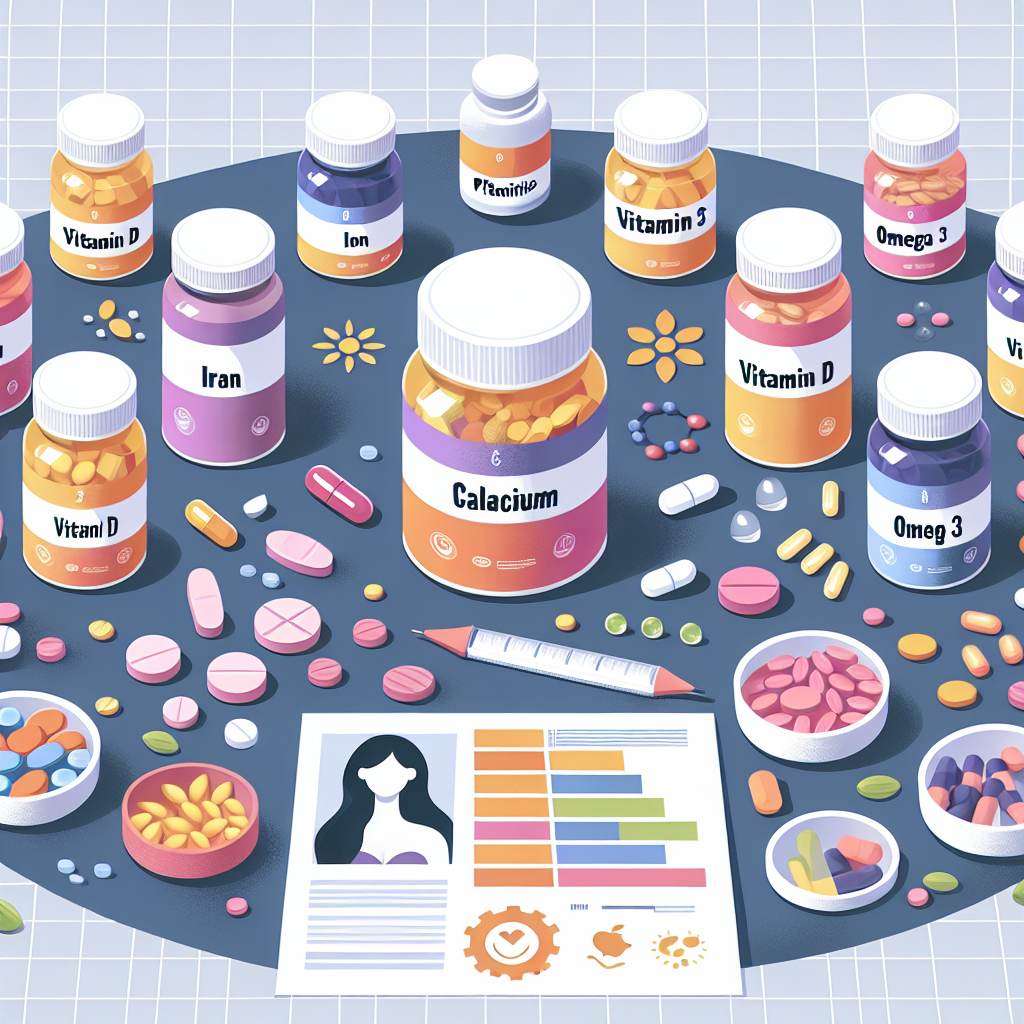Essential Supplements That Support Women’s Health

Discover the essential supplements that support women’s health today! Boost your vitality and wellness with our range of products. Click here to start your journey towards better health.
Understanding the Role of Essential Supplements in Women’s Health
Women’s health is a complex and multifaceted issue that requires a comprehensive approach. One of the ways to support women’s health is through the use of essential supplements. These supplements can provide the necessary nutrients that may be lacking in the diet, thereby promoting overall health and well-being.
Firstly, it is important to understand that the nutritional needs of women are unique and vary at different stages of life. For instance, during childbearing years, women require more iron and folic acid to support the growth and development of the fetus. As women age, the need for calcium and vitamin D increases to maintain bone health and prevent osteoporosis. Therefore, the use of essential supplements can help meet these specific nutritional needs.
One of the most important supplements for women is iron. Iron is essential for the production of hemoglobin, a protein in red blood cells that carries oxygen from the lungs to the rest of the body. Women, especially those with heavy menstrual periods, are at a higher risk of iron deficiency anemia. This condition can cause fatigue, weakness, and a decreased ability to concentrate. Therefore, iron supplements can be beneficial in preventing and treating iron deficiency anemia.
Another essential supplement for women is folic acid. Folic acid is a B vitamin that is crucial for the formation of red blood cells and for the development of the neural tube in a fetus during early pregnancy. A deficiency in folic acid can lead to neural tube defects in the baby. Therefore, women who are planning to become pregnant or are in the early stages of pregnancy should consider taking folic acid supplements.
Calcium and vitamin D are also essential supplements for women. Calcium is necessary for the development and maintenance of strong bones and teeth. Women are at a higher risk of developing osteoporosis, a condition that weakens bones and makes them more prone to fractures. Vitamin D helps the body absorb calcium and is also important for bone health. Therefore, women, especially those over the age of 50, should consider taking calcium and vitamin D supplements.
Omega-3 fatty acids are another important supplement for women. These essential fats are beneficial for heart health and can reduce the risk of heart disease, which is the leading cause of death among women. Omega-3 fatty acids can also support brain health and may reduce the risk of depression and anxiety.
Lastly, probiotics are beneficial supplements for women. Probiotics are live bacteria and yeasts that are good for the digestive system. They can help balance the gut microbiota, which is linked to various aspects of health, including immune function, weight management, and mental health.
In conclusion, essential supplements can play a crucial role in supporting women’s health. They can help meet the unique nutritional needs of women at different stages of life and promote overall health and well-being. However, it is important to remember that supplements should not replace a balanced diet and healthy lifestyle. Before starting any supplement regimen, it is advisable to consult with a healthcare provider to determine the most appropriate supplements based on individual health needs and circumstances.
Top Essential Supplements for Women’s Health and Wellness

Women’s health is a complex and multifaceted topic, with numerous factors contributing to overall wellness. One aspect that often gets overlooked is the role of dietary supplements in supporting women’s health. While a balanced diet is the cornerstone of good health, there are certain nutrients that women may not get enough of from food alone. In such cases, supplements can play a crucial role in filling nutritional gaps and promoting optimal health.
Firstly, calcium is an essential mineral for women’s health, particularly for maintaining strong bones. Women are at a higher risk of developing osteoporosis, a condition characterized by weak and brittle bones, and adequate calcium intake can help prevent this. While dairy products are a good source of calcium, those who are lactose intolerant or vegan may struggle to meet their daily requirements through diet alone. In such cases, a calcium supplement can be beneficial.
Secondly, iron is another crucial nutrient for women, especially those of childbearing age. Iron is necessary for the production of hemoglobin, a protein that helps red blood cells deliver oxygen throughout the body. Women who experience heavy menstrual periods may be at risk of iron deficiency, which can lead to anemia, fatigue, and weakened immunity. An iron supplement can help ensure adequate iron levels, but it’s important to consult with a healthcare provider before starting any new supplement regimen, as excessive iron can be harmful.
Vitamin D is another essential supplement for women’s health. It aids in calcium absorption, promoting bone health, and also plays a role in immune function. Despite its importance, many people, women included, are deficient in this vitamin. This is partly because few foods naturally contain vitamin D, and while the body can produce it when exposed to sunlight, many people don’t get enough sun exposure, especially during the winter months. A vitamin D supplement can help bridge this gap.
Omega-3 fatty acids, commonly found in fish oil supplements, are another key component of women’s health. These essential fats are known for their heart health benefits, but they also play a crucial role in brain health. They may help reduce the risk of depression and improve cognitive function. For women who don’t consume fish regularly, an omega-3 supplement can be a valuable addition to their diet.
Lastly, probiotics, which are beneficial bacteria, are often overlooked but are vital for women’s health. They support digestive health and can also play a role in maintaining vaginal health by preventing the overgrowth of harmful bacteria. Probiotic supplements, often found in the form of capsules or drinks, can help ensure a healthy balance of gut bacteria.
In conclusion, while a balanced diet should always be the first line of defense in maintaining health, supplements can provide additional support where needed. Whether it’s calcium for bone health, iron for blood health, vitamin D for immune function, omega-3s for heart and brain health, or probiotics for digestive and vaginal health, these supplements can play a crucial role in supporting women’s overall wellness. However, it’s important to remember that supplements should not replace a healthy diet and lifestyle, and any changes to your health regimen should always be discussed with a healthcare provider.
How Essential Supplements Contribute to the Overall Health of Women
Women’s health is a complex and multifaceted issue that requires a comprehensive approach. One of the ways to ensure optimal health is through the use of essential supplements. These supplements can provide the necessary nutrients that may be lacking in the diet, thereby contributing to the overall health of women.
Firstly, let’s consider the role of calcium. Calcium is a vital mineral that is essential for the development and maintenance of strong bones. Women, in particular, are at a higher risk of developing osteoporosis, a condition that weakens the bones and makes them more prone to fractures. This risk increases with age, especially after menopause when the body’s production of estrogen, a hormone that protects against bone loss, decreases. Therefore, calcium supplements can be a valuable addition to a woman’s diet to help maintain bone health.
Next, we have iron. Iron is a crucial component of hemoglobin, the protein in red blood cells that carries oxygen from the lungs to the rest of the body. Women are more likely to suffer from iron deficiency due to menstruation. Iron deficiency can lead to anemia, a condition characterized by fatigue, weakness, and a pale complexion. Therefore, iron supplements can help prevent iron deficiency anemia and ensure that the body has enough red blood cells to transport oxygen efficiently.
Vitamin D is another essential supplement for women’s health. It aids in the absorption of calcium and phosphorus, two minerals that are vital for bone health. Moreover, research suggests that vitamin D may play a role in immune function and may help protect against autoimmune diseases, which are more common in women than in men. Unfortunately, many people do not get enough vitamin D from sunlight or food alone, making supplementation necessary.
Folic acid, also known as folate, is a B vitamin that is crucial for women of childbearing age. It helps prevent neural tube defects, serious birth defects of the baby’s brain and spine. The Centers for Disease Control and Prevention recommends that all women of reproductive age take a daily supplement containing 400 micrograms of folic acid.
Lastly, omega-3 fatty acids, found in fish oil supplements, are essential for heart health. They can lower the risk of heart disease, the leading cause of death for women in the United States. Omega-3 fatty acids can reduce inflammation, lower blood pressure, and decrease triglyceride levels.
In conclusion, essential supplements can play a significant role in supporting women’s health. They can fill nutritional gaps and help prevent a variety of health conditions, from osteoporosis to heart disease. However, it’s important to remember that supplements should not replace a balanced diet and regular exercise. They are meant to complement a healthy lifestyle, not substitute it. Before starting any supplement regimen, it’s advisable to consult with a healthcare provider to determine what is best for your individual needs. With the right approach, supplements can be a valuable tool in maintaining and enhancing women’s health.